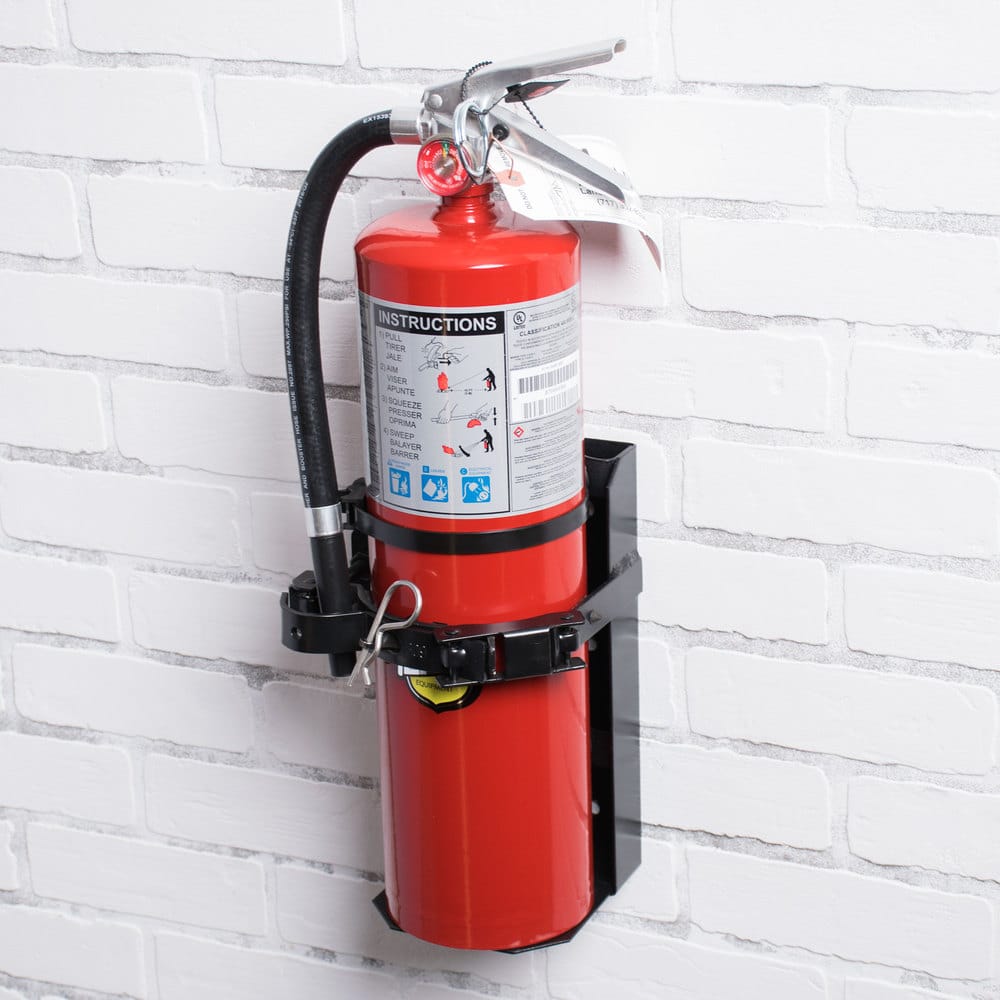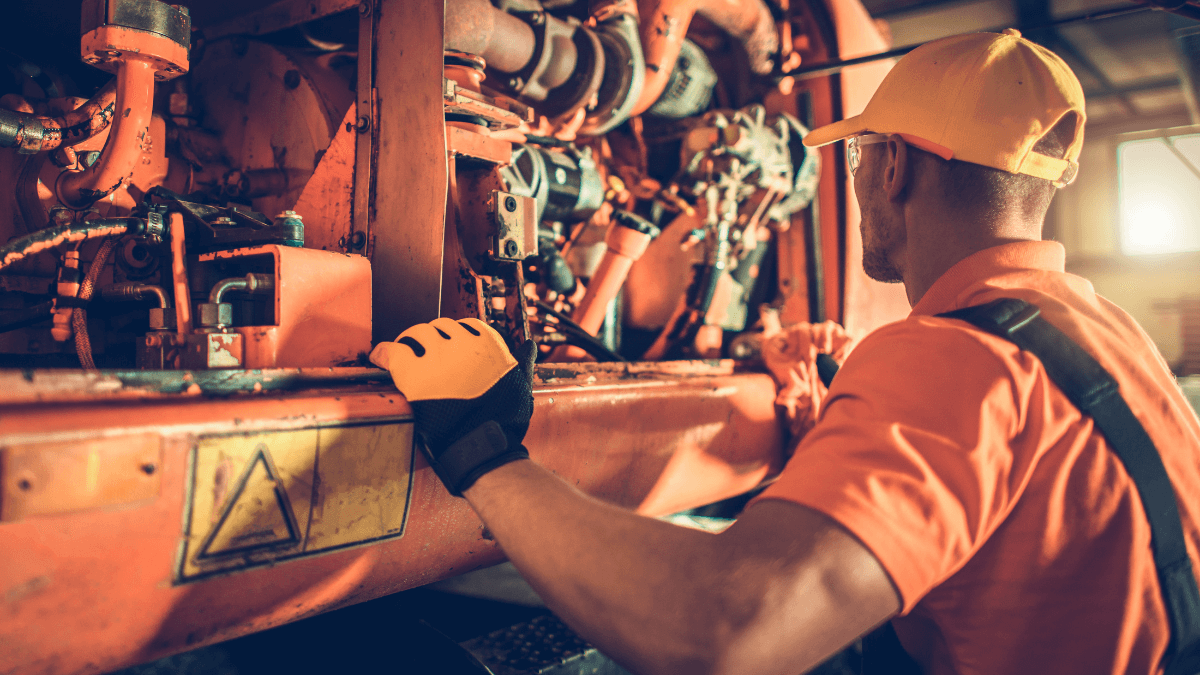Whether you own or work for a small, mid-sized or large construction business, there are some things you should always consider when buying new power tools.
In this article, we’ve singled out eight of the most important ones, so keep reading to ensure you’re buying quality tools and the best value for your money.
In this article...
The Tool’s Features
The tool’s features should be your first consideration. In other words, what’s the right tool for the job?
Power tools (and their brands) can roughly be split into three categories: homeowner, semi-professional, and professional, but there’s a lot of overlap between them.
In other words, a specific power tool you’ll choose for your business doesn’t have to be professional-grade, but that nevertheless might be the best way to go when tool features are concerned.
Why? Because professional power tool makers have the experience, expertise, and resources to design and test their tools with durability in mind.
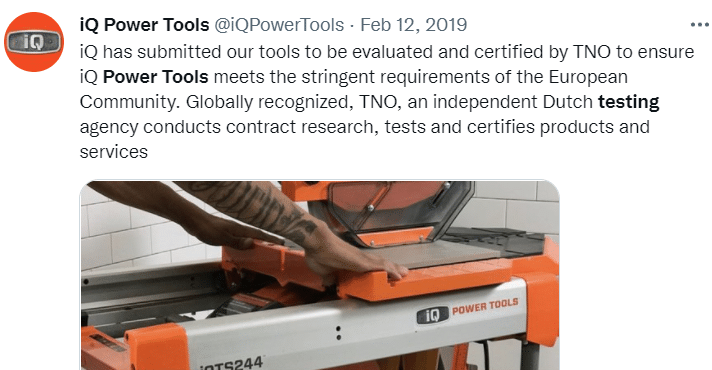
To quote Mitch Burdick, manager at Bosch Tools:
“The two biggest threats affecting tool life are debris (dust) and heat.”
As we know, construction work usually involves a lot of both. And having durable tools that were tested for such conditions can ultimately prevent project delays and potential injuries.
So, in addition to looking at the tool’s performance, reliability, and value (i.e., price), you should also consider the tool’s durability. For instance, the manufacturers of the product below even highlight its durability in their advertising.
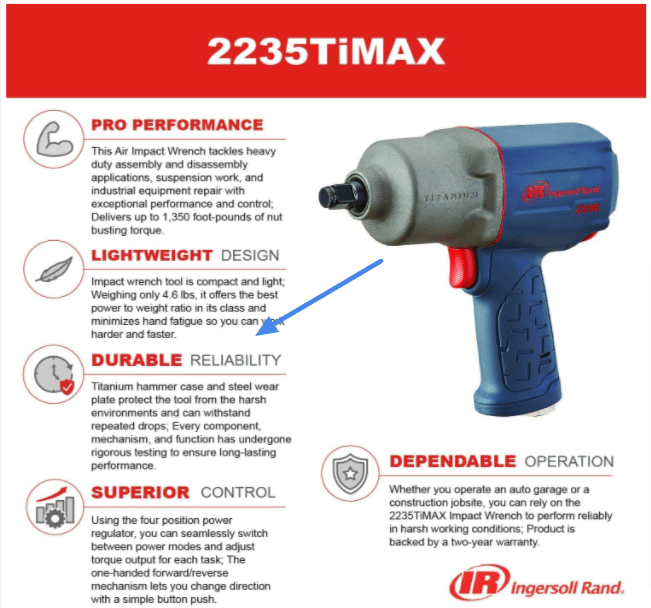
As for other tool features, questions to ask include:
- What do we need this tool to do? Can it do that?
- Is it a multifunctional tool that can do a variety of tasks?
- Alternatively, is it a specialty tool we need for something very specific?
- Would a stronger or bigger model be a more sensible choice for its intended purpose?
In conclusion, knowing what you want from your power tools while focusing on their performance and durability will ensure your construction business is running smoothly.
The Price
Of course, many people consider the price to be the decisive factor in their purchasing decisions.
Even if so, it is good to ask oneself what price aspects need to be considered. Are there other factors at play?
And, ultimately, how can your business purchase the best-quality tools at the right price?
Suppose you’re looking to buy cordless drills for all your construction workers.
First, you have your budget, meaning you know how much you can spend on this batch of power tools.
Second, you have the number of drills you’re looking to acquire. In other words, don’t buy more than you need even at a great discount—storage costs money and new, improved models are coming out regularly.
Otherwise, you might experience buyer’s remorse, like numerous American consumers.
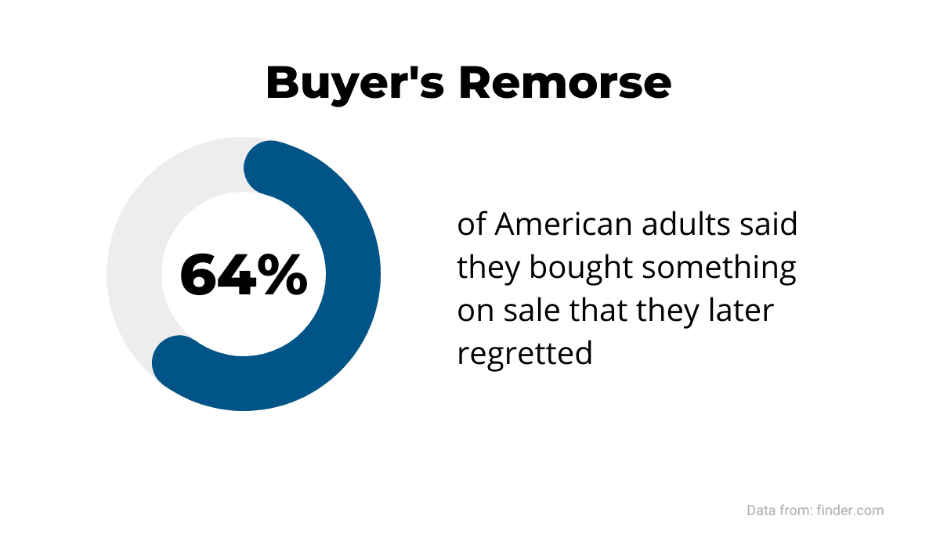
Third, you need to consider the true cost of your power tools. For cordless drills, the crucial question is whether batteries are included or not.
In fact, it’s a standard sales strategy to make the tool cheaper by excluding other accessories, which are then sold at a mark-up.
When both the price and features are concerned, there is a lot of helpful information out there. You can use any professional forum or review site to see what’s available.
For example, Pro Tool Reviews offer plenty of insights in their buying guides.
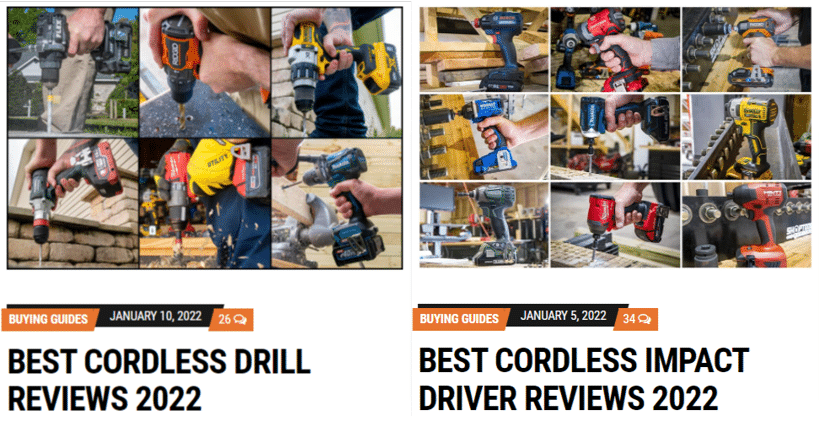
Taking all of these factors into account will enable you to make a much better-informed decision on what’s the best available tool for the efficient operation of your construction crews.
The Safety Features
Whether on construction sites or in workshops, safety should always come first. The safety features of your power tools are another important aspect to consider when making a purchase.
Prudent decisions in this matter can literally save lives and cut costs at the same time.
When it comes to power tools, especially those used extensively in construction projects, the truth is they are (or can be) dangerous. And injuries are always unexpected.
Let’s look at just one of the widely used power tools in construction, the nail gun.
The tool needs to be handled carefully, at’s best illustrated by this quote from the Centers for Disease Control and Prevention (CDC):
“Nail guns are powerful…. they are responsible for an estimated 37,000 emergency room visits each year—68% of these involve workers”.
Therefore, if you’re buying a nail gun, the safety features of the models you’re considering will constitute a very important aspect of your decision-making process.
So, when looking for nail guns, it’s wise to first read OSHA’s Nail Gun Safety:
A Guide for Construction Contractors or the CDC guide, which provides its recommendations in an easy-to-read format. Both are shown below.
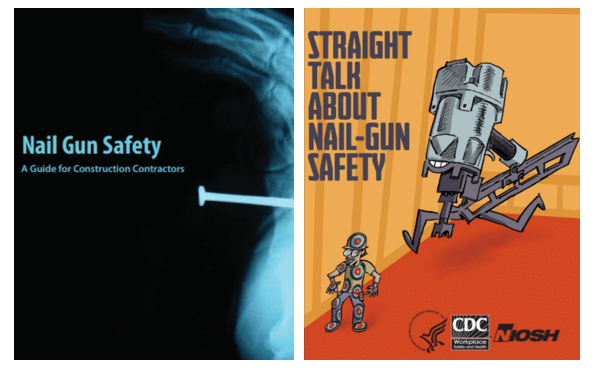
Both will inform you about what safety features to look for when shopping for nail guns. For instance, the OSHA guide tells us that the full sequential trigger is the safest bet.

It’s clear from this example that the safety features of any power tools you’re buying should be carefully examined.
If you check what the standard safety features of a power tool are and how they comply with the recommended or prescribed standards, you’ll know you’ve done everything to protect your workers from injuries and your business from the related costs.
The Warranty
Getting the best price might come at the expense of the warranty terms and duration. Knowing exactly what you’re getting and for how long can save you a lot on maintenance and repair expenses.
Of course, comparing power tool warranties calls for some research.
Luckily, there are others who’ve already done it, like this ToolBoxBuzz article.
When the warranty periods they researched are combined with the top 5 professional power tool brands, according to another article, this is the result.
We added Hilti out of respect for their quality and over 80 years of experience.
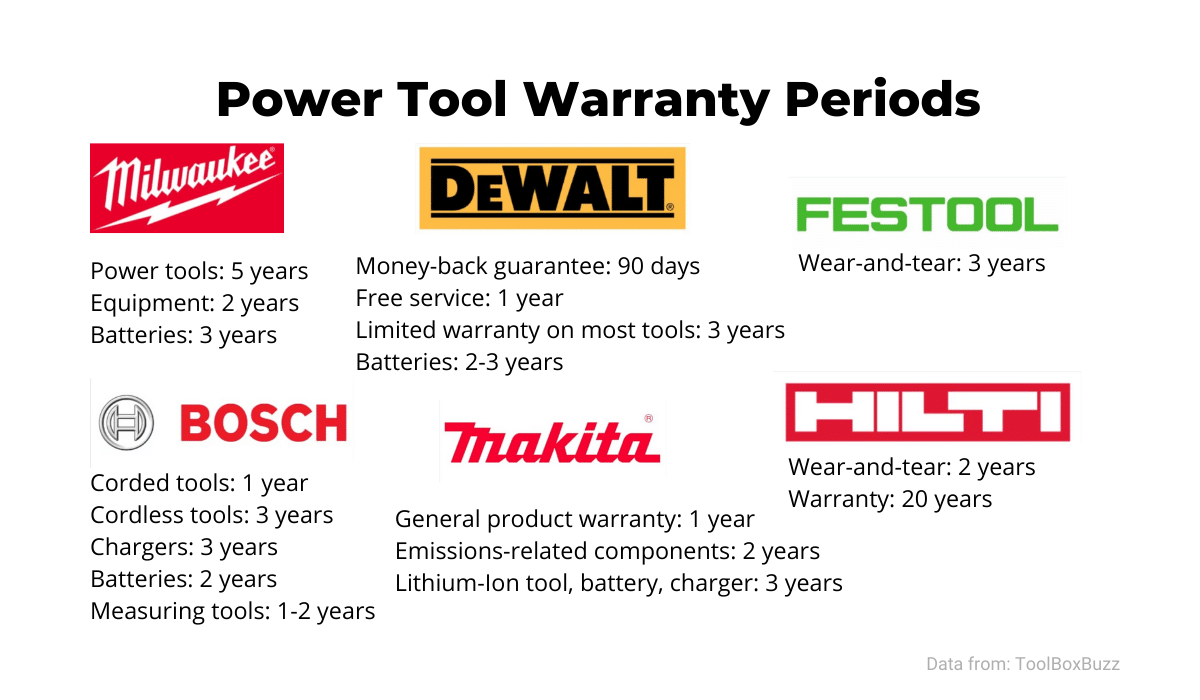
In fact, it’s safe to say that a cheaper tool can end up costing you more because of its warranty. Here’s how.
Let’s say you’re looking for a Milwaukee Hammer Drill/Impact Driver Kit. Naturally, the first place to look is Amazon.
You type in the words, and there it is.

Everything looks okay. The price is $349.00, and Amazon even recommends it. Moreover, when compared to the Acme Tools price below, it’s $50 cheaper.

But there’s a catch that could cost you much more than $50 down the line. Since Amazon isn’t an authorized seller of Milwaukee tools, there’s no guarantee that the tool will include a warranty.
In fact, that could explain this $50 difference because Acme Tools is an authorized seller and will include a warranty for the price.
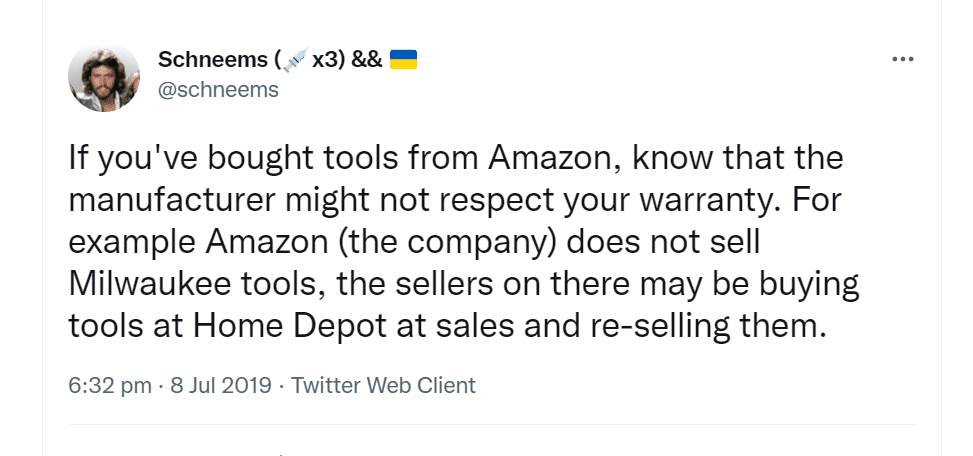
On the other hand, Amazon is an authorized seller of DeWalt tools, which is evidenced by the fact that it has a DeWalt Store available.
So, if you’re buying tools off Amazon, check if it’s an authorized seller first to ensure you’re not buying knockoffs, refurbished, or liquidated tools.

By the way, this is also true for some other well-known brands like Ridgid and Ryobi (sold via Home Depot)
So, although both DeWalt and Milwaukee drill kits have warranty info on their Amazon listing, you can be sure only about the DeWalt warranty.
When it comes to Milwaukee, you’re in treacherous waters.
And that’s how a $50 cheaper tool (or a hundred of them) can cost you far more in maintenance and repair costs, not counting the hassle and downtime.
Hence, knowing the ins and outs of online shopping (in this case) and of your warranty terms and duration (in general) can save you a lot of trouble and quite a bit of money.
The Storage
When your business has amassed a vast collection of power tools, storage is something that should be considered when buying new ones.
Proper storage keeps them in mint condition and extends their lifespan, thus protecting your investment.
We can say proper power tool storage comes down to two things: conditions and organization.
First, is the storage conditions.
Does your business own or rent the type of storage that will protect the tools from their biggest enemy, rust?
Since moisture and temperature fluctuations are the key factors for rust-forming, you’re looking for a dry and cool space, preferably with temperature and humidity control.
And there are even more best practices you should be implementing.
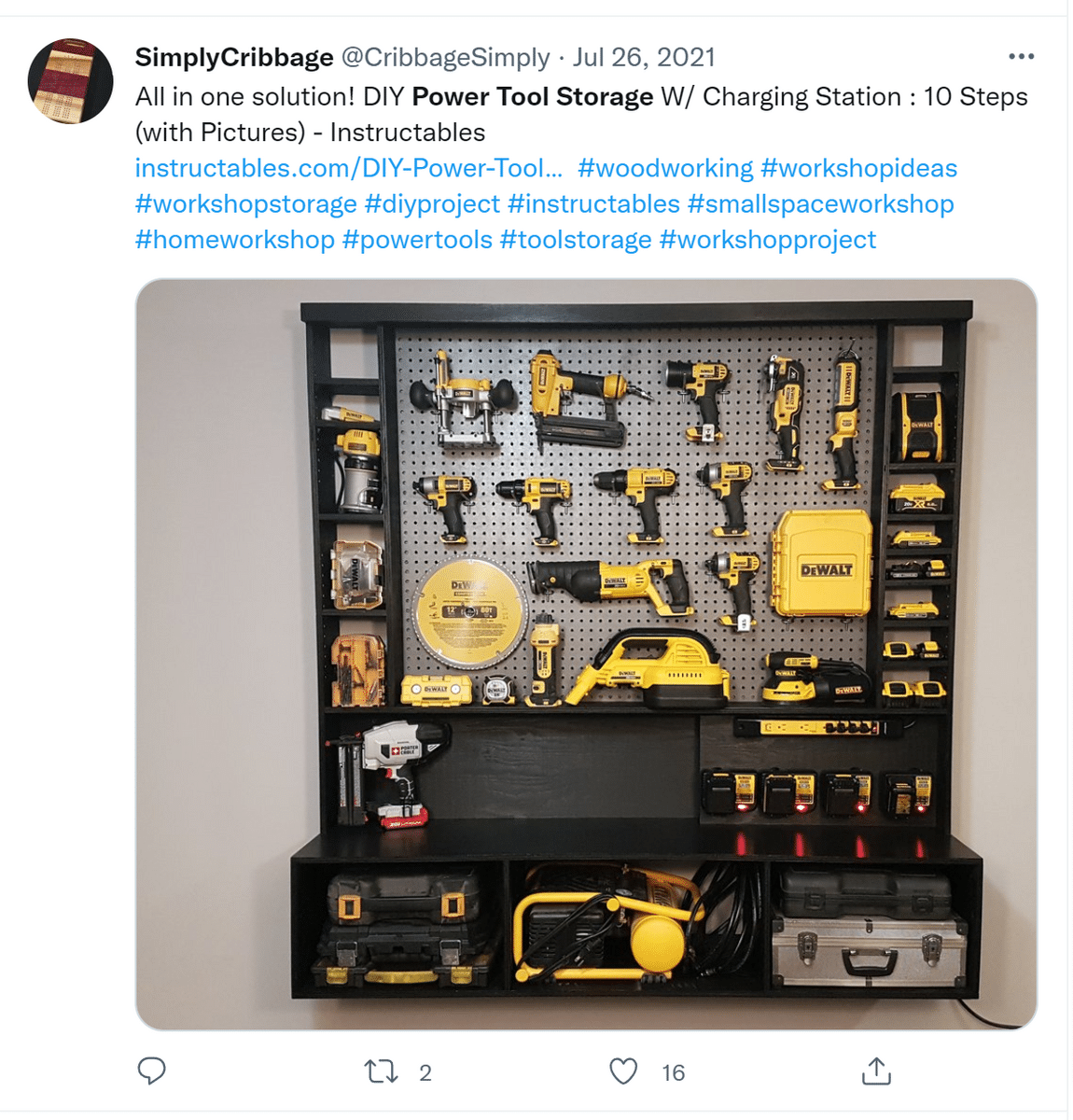
Next is security.
Does your storage meet the minimum security requirements for keeping tools out of reach of unauthorized personnel, including children and protecting tools from theft?
When storage organization is concerned, your considerations will depend on the storage location—for example, company warehouse or construction site storage. Or several of them on ongoing projects.
You can even acquire a vehicle to serve as safe tool storage, like the one in the example below.

Regardless of the location, your storage needs to be well-organized, so your team has access to what they need.
That said, when your business has a grand collection of power tools, hand tools and other equipment, it might be best to introduce QR code labeling and establish a check-in/check-out system for your tools.
That way, you’ll know where all your tools are at any moment.
Our tool tracking software, GoCodes, does that in a simple and affordable way, harnessing the power of smartphones, patented QR codes, and cloud software.
Just scan the tag and find out everything you need to know about it, including maintenance schedules and even manuals for use.
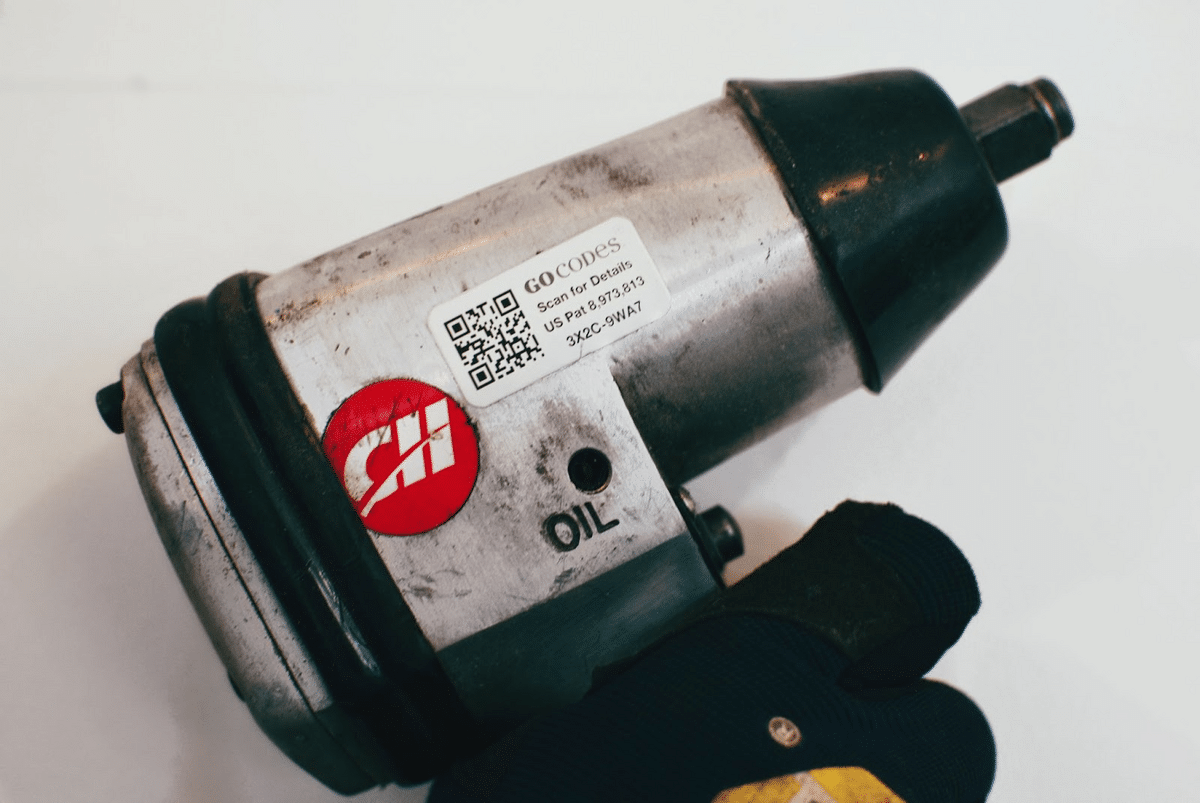
With optimal storage conditions and some prudent decisions in terms of power tool storage organization, you’ll be able to protect your investment, reduce maintenance costs and increase the productivity of your business.
Difference Between Branded and Generic Tools
When it comes to branded vs. generic tools, the power of the Internet and the effects of the pandemic have changed buying habits towards more affordable solutions.
On the other hand, power tool brand loyalty is still a decisive factor for many.
Let’s see what you should consider when opting for one or the other.
Regardless of the brand, you’re looking for durable quality tools that can do the job under heavy-duty use conditions and still offer good value for money.
Nowadays, your options are virtually endless. With the power tool industry being so big and diverse, and everything just a click or two away, some serious research is required.
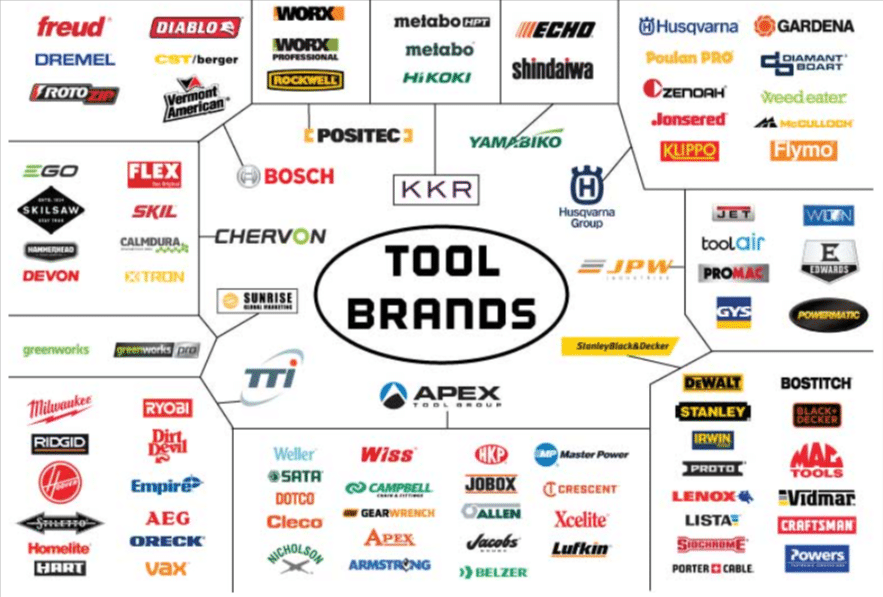
That said, if you asked contractors what they thought of generic brand tools, you’d mostly get thumbs down, with some rare exceptions and lucky finds.
Since you’re looking at long-term intense use under demanding conditions on jobsites, it makes sense to invest a bit more in professional brands.
This especially goes for more expensive tools where you want to have strong service and support bigger brands generally have, thus saving on maintenance costs.
Compared to generic brands, branded power tools tend to come out on top in terms of material quality, design, features, performance, strength, durability, anti-corrosion protection, etc.
That said, here’s how those top 5 professional brands we mentioned look when their search results over the last 12 months are compared, clearly showing where the battle of giants between branded power tools is taking place.
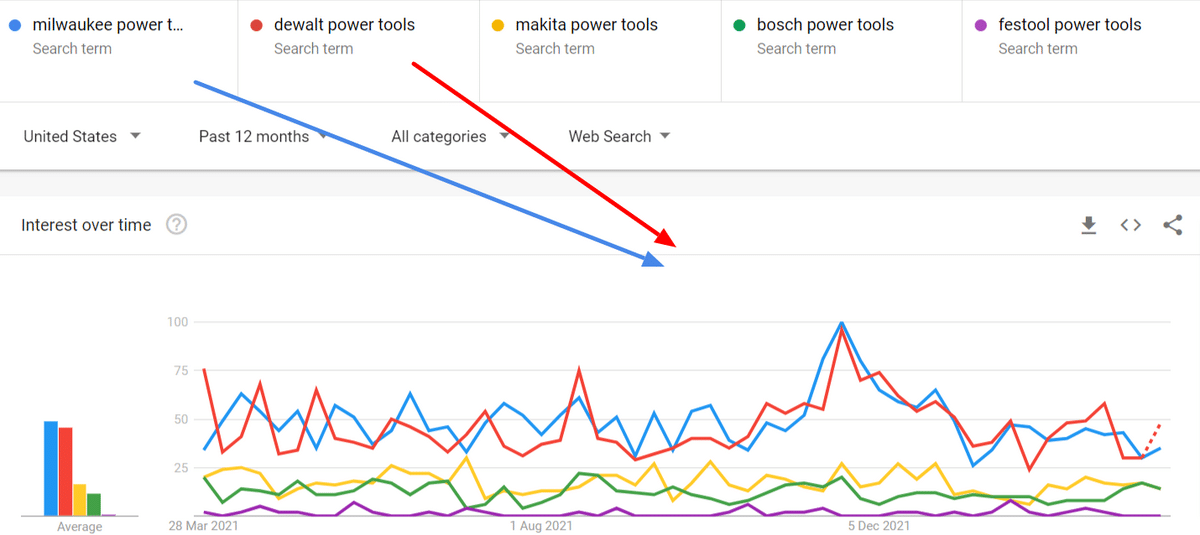
It’s clear that Milwaukee and DeWalt are leading the way, followed by Makita over Bosch, and Festool coming in last.
Mind you, this is just what users are searching for. And this certainly does not apply to entire tool lines. In the construction industry, brand loyalty rarely applies to all power tools made by a specific brand.
This point is nicely illustrated by the following two comments from this article about brand loyalty where power tools are concerned.


So, in light of the fact that everyone has some research to do before deciding on a (professional) brand for the specific power tool they’re looking for, this last comment takes us to the next thing to consider when buying new power tools.
Plug-In vs. Cordless
When buying new power tools, the question of whether to go for a corded or cordless version of the power tool you want is definitely important.
Sometimes a combination of both works best. Making the right choices can ensure your construction projects are done efficiently and on schedule.
When it comes to workshops, the plug-in vs. cordless debate is often moot. That’s where the advantages of corded power tools really shine. Like this Makita circular saw, for example.
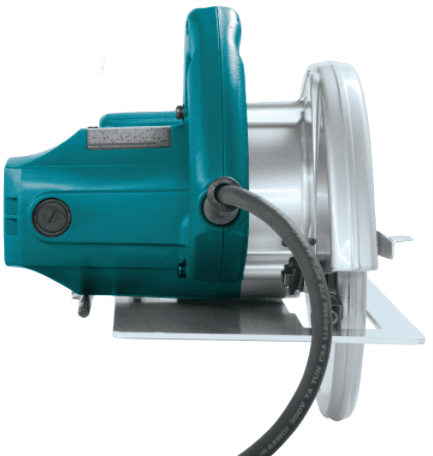
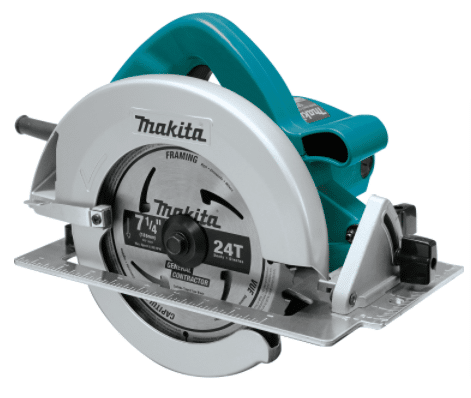
Its powerful 15.0 AMP motor provides a high power-to-weight ratio, making it ideal for busy workshops.
With continuous power supply, greater strength, and no performance drop during prolonged use, Makita corded power tools are clearly the way to go. A good example of this are circular and reciprocating saws that provide steady performance and longevity.
However, when working on construction projects, there are many jobs for which cordless power tools are ideal. Their mobility, range, and easy maneuverability, coupled with battery advancements, have made them very popular.
In fact, according to a Future Market Insights (FMI) report, the sales of cordless power tools will fuel the growth of the global power tools market, which is expected to grow 5.1% annually between 2021 and 2031.
That said, your purchasing decision will depend on the tool type, its intended use, and its location.
For example, those inconvenient, narrow spaces almost every project has are better handled by portable cordless power tools, like the one pictured below.
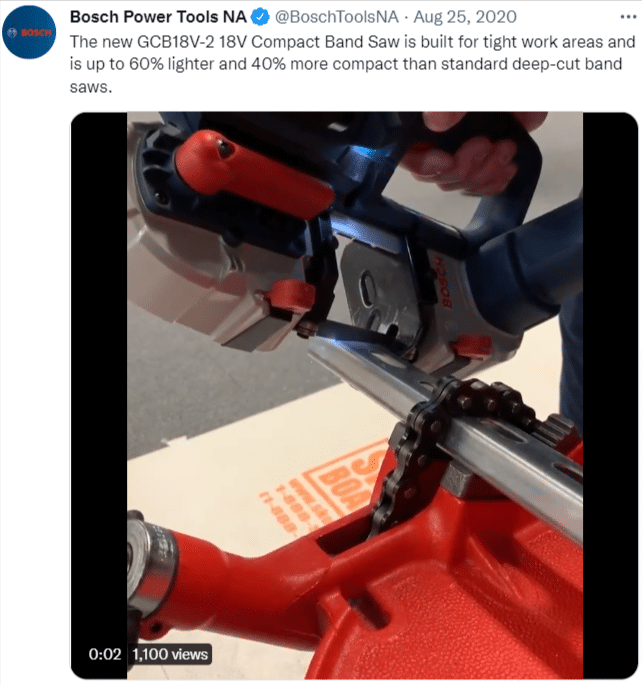
So, the best tip is not to be exclusive. Corded tools are more suitable for some types of jobs, and corded for the others.
The solution is to know what you need and simply include both options accordingly. That way will keep your construction projects running smoothly.
Accessories Needed
We already mentioned accessories and the effect they can have on the price of power tools. However, their range, complexity, and quality considerations warrant some further research.
Coupled with the fact that batteries are considered accessories, it’s clear that good decisions in this area can prevent some issues and keep your construction projects going as planned.
As said, when it comes to batteries, the key question when buying new tools is whether they come with batteries included or not. The next question is their interchangeability.
This is succinctly answered below:
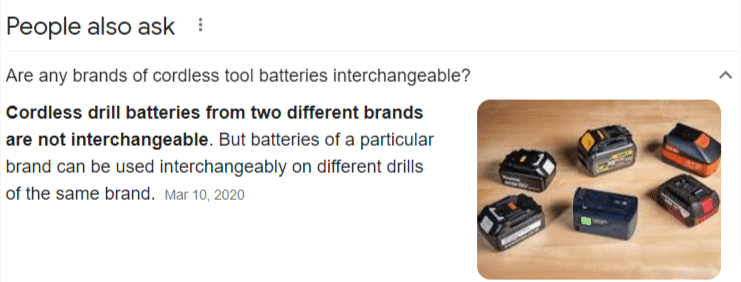
The above answer forces you to consider going the one-brand-only way. A good marketing strategy, isn’t it?
A practical piece of advice is to ignore such considerations and go for the best cordless tool for your business, regardless of the brand.
Why? Because the market offers efficient ways around this issue.
Like the one in this tweet:
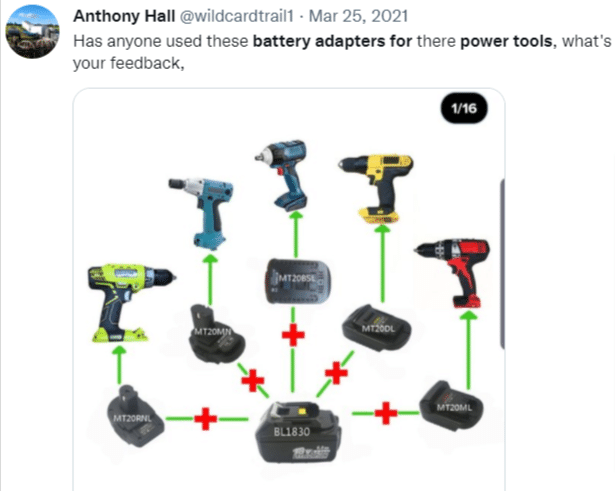
To quote Nat Taylor in his blog on interchangeable power tool batteries:
“[Using] battery adapters means that I can piecemeal upgrade my tools, and that I can mix-and-match brands.”
There are some very practical adapters out there that will let you run almost any tool on virtually any battery.
For instance, the one shown in a YouTube video on a battery adapter enables you to exchange battery packs between different brands with ease, so you end up with interchangeable batteries across the power tool spectrum, as shown in this image.
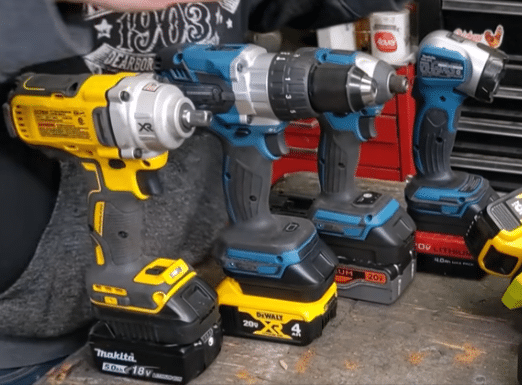
As for all other accessories for all the different power tools, there are some general precautions to consider when buying them.
The first one is the same as with batteries. In other words, check what accessories are included with the tool.
Any extra accessories could make the job easier and safer for your crew. Some of them make the tool multifunctional, so you could even save some money on other tools.
In the shop, check the price of packages sold separately from the tool, like drill bits and saw blades.
Then, compare their prices to the offer online; you may be able to get packages somewhere else for less money, or even get a discount for buying 50 of them.
As to branded vs. generic accessories, the same rule applies as with power tools—proven quality and reliability go hand in hand with construction site safety and productivity.
Thus, accessories should definitely factor in your decision when buying new power tools.
Conclusion
Having gone through eight things you should consider, it’s evident that your purchasing decision will depend on your experience, budget, and business needs. In any case, doing your homework on any power tool you consider buying for your business is crucial.
We hope this article has provided some valuable insights and tips to set you on the path to getting the best tools for your business.




